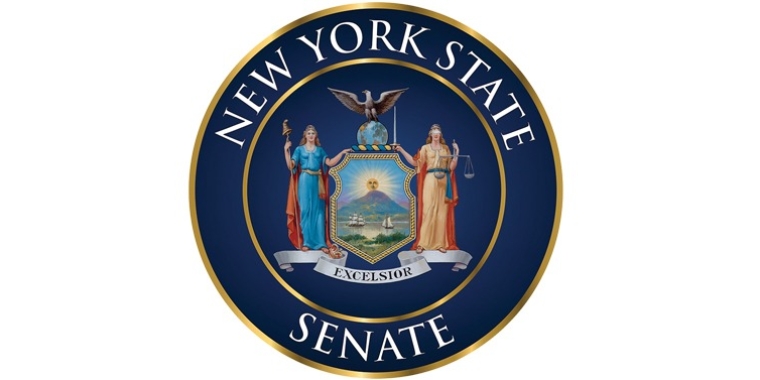
Senators Hoylman-Sigal & Krueger and AM Tony Simone's Testimony on Madison Square Garden's Special Permit
June 7, 2023
-
ISSUE:
- Madison Square Garden
Testimony of New York State Senators Liz Krueger and Brad Hoylman-Sigal & Assembly Member Tony Simone Before the New York City Planning Commission on the Madison Square Garden Arena Special Permit
Thank you for the opportunity to comment on Madison Square Garden’s (MSG) application for a Special Permit to allow it to continue operating in its current location.
As members of the State Senate and Assembly whose districts overlap with the Penn District, we urge New York City to reject MSG’s renewal application. On June 2, 2023 the leadership of Amtrak, the Metropolitan Transit Authority (MTA) and New Jersey Transit concluded that the venue is incompatible with Penn Station. The Compatibility Report issued by the transit agencies states that “MSG’s existing configuration and property boundaries impose severe constraints on the station that impede the safe and efficient movement of passengers and restrict efforts to implement improvements.” However, if New York City ultimately decides to issue a renewal of the Special Permit, it must be for a maximum of three years and be contingent on MSG making all the concessions deemed necessary by the MTA and the Department of City Planning to make the arena fully compatible with the planned redesign of Penn Station.
Penn Station is the heart of New York City’s transportation system, and the busiest rail hub in the Western Hemisphere. Sitting at the key point of the Northeast Corridor, and serving New York City Transit, Amtrak, Long Island Railroad, and New Jersey Transit, it is the point of arrival and departure for more than 650,000 people every day. Its importance to the economic and social fabric of our city, state, and country is incalculable.
For too long, Penn Station has played second fiddle to MSG’s operations as an entertainment facility. The current arena was first constructed in 1968 at the cost of much of Penn Station’s functionality. This involved the complete demolition of the original above-ground Pennsylvania Station and the major redesign of the station’s
below-ground elements, including the placement of support columns which affect the ability of passengers to wait safely and comfortably on train platforms. In addition to impeding the functionality of Penn Station, Madison Square Garden pays no property taxes. This tax break, which was first awarded in 1982, is valued at about $42 million per year.
The constraints placed on Penn Station by MSG’s current location are considerable. The current station, designed for 200,000 daily users, now handles more than 650,000 daily users, and is straining under the effects of an increase in usage absent an increase in capacity. This contributes to severe congestion on the rail platforms and transit corridors, and places limitations on train frequency. The low ceiling heights and limited air flow into the concourses and rail platforms caused by the supremacy of MSG over the public transit infrastructure below also presents a safety risk. As Community Board Five stated in its resolution, the National Fire Protection Association (NFPA), the organization responsible for setting fire safety code for public structures, has ruled that the current state of Penn Station platforms do not meet the requirements for safe evacuation in the case of emergency. This is due in great part to the columns needed to support MSG taking up valuable platform space, along with the aforementioned lowered ceilings.
It is essential in our view as public representatives that Penn Station receive a redesign deserving of its status as a world-class transit hub, emphasizing increased space for riders and greater safety measures than are allowed by the present infrastructure. While we would prefer to see MSG move to facilitate a total transformation of Penn Station, absent of that we believe the granting of a new Special Permit should be limited to three years. A new special permit must be contingent on MSG making itself fully compatible with Penn Station as defined by the leaders of the transit agencies that utilize the facility. MSG must be required to provide the MTA all the spaces necessary for the agency’s Penn Station Reconstruction Plan at no cost. This includes the taxiway for the construction of the mid-block train hall, which is essential to increase light and air in the station and areas along 8th Avenue to construct new higher-capacity and accessible entrances.
A new Special Permit, limited to three years, should additionally be contingent on MSG transforming how it handles loading operations and improving access to public spaces above and below ground. MSG’s loading has long taken place on public streets and caused significant disruptions to vehicular and pedestrian flow; all loading must be moved beneath the arena. We also fully support the Department of City Planning’s proposal to require MSG to provide adequate public spaces, amenities, and entrances compatible with transit facilities and encourage Madison Square Garden to work with Community Board 5 and local stakeholders to achieve an “ambitious public realm scheme.” This should include positive activation of the plazas, high quality public realm design, improved wayfinding, increased bike storage, and public bathroom facilities. It is also essential that MSG enter into a restrictive declaration with the City, which outlines all of the aforementioned requirements, which is recorded against the property.
The MTA, New Jersey Transit, and Amtrak have a rare opportunity to transform Penn Station into the modern, safe, and efficient transit facility that New Yorkers and visitors deserve. We strongly urge the City Planning Commission to ensure that this opportunity is not wasted by placing the needs of Penn Station and the surrounding community above MSG’s desire to operate its arena as it has for decades.
Thank you for your time and consideration of our comments.
Share this Article or Press Release
Newsroom
Go to NewsroomLetter to Con Edison
March 26, 2025
Letter to Governor Hochul on Delaying CDPAP Transition
March 21, 2025
